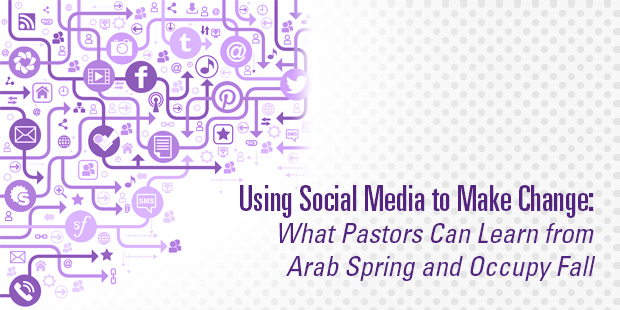
Using Social Media to Make Change: What Pastors Can Learn from Arab Spring and Occupy Fall
Social media has started a revolution in how people connect, learn and communicate, and its effects cannot be undone. – Brian Solis
In 2011, the world was introduced a powerful uprising in the Middle East that would later become known as the “Arab Spring.” Facebook, Twitter and YouTube served as the nervous system of shared repression and fed the rise against tyranny.
A few short months following the Arab Spring, the Occupy movement emerged to rally consumer discontent to protest against big businesses, corrupt financial industries, and rising unemployment.
While history books will pay credit to social networks for their role in aligning restlessness with revolt throughout the Arab Spring and Occupy movements, what’s important to not overlook or underestimate is the shared experiences and sentiment of people. It is people, not networks, who bring about transformation.
Leaders must demonstrate why their vision is important, and articulate how they will lead us toward something more substantial than we know today.
Most notably, social media is helping to facilitate real world revolutions by bringing together passionate people around social platforms to organize efforts and achieve desired outcomes.
And through each, the world learns the importance of Facebook, Twitter, YouTube and other emerging networks in our society. As the old saying goes, “we ain’t seen nothing yet.” Change is in the air and the ties that bind are formed through the relationships between people who share online connections, experiences, and real world aspirations.
Thought leader Brian Solis has written a manifesto for change, to bring about evolution or revolution for what it is you believe in, for what it is you wish to change in your world. This was written to spark your rallying cry. His intention was to help you unlock what it is you already possess, a vision to see things differently, the way they should be, and a heart to inspire those around you to bring your vision to life.
We are no longer bystanders. It’s time to take a stand. You are an activist for transformation. You are the change agent your organization or cause so desperately needs.
To help lead transformation and change, Solis has developed 10 steps through which a leader can become motivated and aligned with the new mission and vision.
Look in the mirror and you will see change staring back at you. And as they say, objects in the mirror are closer than they appear.
Download Brian’s manifesto on transformation here.

Tags: Brian Solis, Change, Social Media












